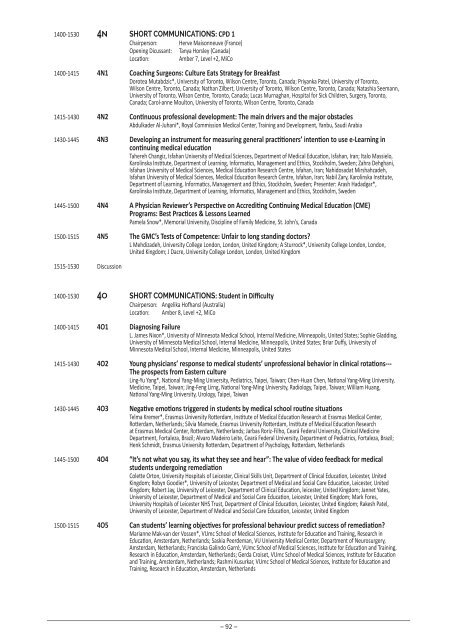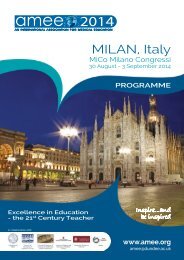2MONDAY 1 SEPTEMBER 20141415-1430 4L2 Reliability and validity for assessing the competence and practice readiness of internationalmedical graduatesClaudio Violato*, Wake Forest University, School of Medicine, Winston-Salem, United States; Penny Davis, University ofSaskatchewan, School of Medicine, Saskatoon, Canada; Nancy Allan, University of Saskatchewan, Saskatoon, Canada1430-1445 4L3 The Relationship between Performance on the International Foundations of Medicine® (IFOM®)Clinical Science Examination and the United States Medical Licensing Examination® (USMLE®)Step 2 CKCarol Morrison*, National Board of Medical Examiners, Scoring Services, Philadelphia, PA, United States; John Phebus,National Board of Medical Examiners, International Programs, Philadelphia, PA, United States; Brownie Anderson, NationalBoard of Medical Examiners, International Programs, Philadelphia, PA, United States; Stephanie Woodward, NationalBoard of Medical Examiners, Scoring Services, Philadelphia, PA, United States1445-1500 4L4 Med-MOTION Project: implementing mobility by 5 pilot projectsC Le Jeunne, Université Paris Descartes, Paris, France; K Van Liempt and J Derdelinckx, Antwerp University and EMSA-Antwerp, Antwerp, Belgium; U Arnold, Charité Universitätsmedizin, Berlin, Germany; RM Langer, Semmelweis University,Budapest, Hungary; F Kristmundsdottir, University of Edinburgh, Edinburgh, United Kingdom; G Nilsson, KarolinskaInstitutet, Stockholm, Sweden; Presenter: FI Wolf*, Università Cattolica del Sacro Cuore, Rome, Italy1500-1515 4L5 A pilot study to explore the challenges of European health professionals working outside theircountry: The example of Italian doctors in the UKNora Di Tomasso*, St Georges Hospital, General Intensive Care Unit, London, United Kingdom; Giovanni Serena, St GeorgesHospital, General Intensive Care Unit, London, United Kingdom; Valeria Alicino, St Georges Hospital, General IntensiveCare Unit, London, United Kingdom; Antonino Poma, St Georges Hospital, General Intensive Care Unit, London, UnitedKingdom; Michela Vitale, St Georges Hospital, General Intensive Care Unit, London, United Kingdom; Calogero Di Liberto,St Georges Hospital, General Intensive Care Unit, London, United Kingdom1515-1530 4L6 International faculty development programs with focus on developing countries: How tosuccessfully support medical faculties in rapidly growing economiesFabian Jacobs*, CIH- Center for International Health, Institute for Medical Education, Munich, Germany; Martin Fischer,Ludwig Maximilians Universität, Surgery, Munich, Germany; Matthias Siebeck, CIH, Ludwig Maximilians Universität,Munich, GermanyNo discussion1400-1530 4M SHORT COMMUNICATIONS: Curriculum Subjects 1Chairperson: T J Jirasevijinda (United States)Location: Amber 6, Level +2, MiCo1400-1415 4M1 A Hybrid Course for NeuroscienceStanley Jacobson*, Tufts University School of Medicine, Integrative Physiology and Pathobiology, Boston, United States;Susan Albright, Tufts University School of Medicine, Department of Technology for Learning in the Health Sciences andTUSK- Enterprise Educational System, Boston, United States; Mark Bailey, Tufts University School of Medicine, Departmentof Technology for Learning in the Health Sciences and TUSK- Enterprise Educational System, Boston, United States1415-1430 4M2 Developing Forensic Medicine Internship Programme and LogbookOrhan Odabasi*, Hacettepe University, Medical Education and Informatics, Ankara, Turkey; Sevgi Turan, HacettepeUniversity, Medical Education and Informatics, Ankara, Turkey; Aysun Balseven Odabasi, Hacettepe Univesity, ForensicMedicine, Ankara, Turkey; Ramazan Akcan, Hacettepe University, Forensic Medicine, Ankara, Turkey; Ali Riza Tumer,Hacettepe University, Forensic Medicine, Ankara, Turkey; Melih Elcin, Hacettepe University, Medical Education andInformatics, Ankara, Turkey1430-1445 4M3 Psychiatric education in the context of problem-based medical educationMichael Andresen*, School of Medicine, Örebro University, Örebro, Sweden1445-1500 4M4 Psychology in Saudi Arabia’s Medical schools: In which department does it belong?Ahmed Alkhalaf*, Faculty of Medicine, AlBaha University, Department of Family and Community Medicine, AlBaha, SaudiArabia; Emad A Koshak, Faculty of Medicine, AlBaha University, Medicine Department, AlBaha, Saudi Arabia1500-1515 4M5 Education in personalised medicine, new topics, new links, new methodsMarie Karlikova*, Faculty Hospital in Pilsen and Charles University of Prague, Faculty of Medicine in Pilsen, Laboratoryof Immunoanalysis, Pilsen, Czech Republic; Ondrej Topolcan, Faculty Hospital in Pilsen and Charles University of Prague,Faculty of Medicine in Pilsen, Laboratory of Immunoanalysis, Pilsen, Czech Republic; Jiri Polivka jr., Faculty Hospital inPilsen and Charles University of Prague, Faculty of Medicine in Pilsen, Department of Neurology, Pilsen, Czech Republic;Jiri Polivka, Faculty Hospital in Pilsen and Charles University of Prague, Faculty of Medicine in Pilsen, Laborytory ofImmunoanalysis, Pilsen, Czech Republic; Judita Kinkorova, Technology Centre AS CR, Prague, Czech Republic1515-1530 4M6 Initiating End-of-Life Discussion With Medical Students: Perspective and Awareness of Dealingwith the “Elephant in the Room”Fernando Henrique Bergo de Souza e Silva*, UNICAMP, Emergency Department, Campinas, Brazil; Marco Antôniode Carvalho Filho, UNICAMP, Emergency Department, Campinas, Brazil; Marcelo Schweller, UNICAMP, EmergencyDepartment, Campinas, Brazil; Diego Lima Ribeiro, UNICAMP, Emergency Depatment, Campinas, Brazil; Bruno de Jorge,UNICAMP, Abilities Lab, Campinas, BrazilNo discussion– 91 –
1400-1530 4N SHORT COMMUNICATIONS: CPD 1Chairperson: Herve Maisonneuve (France)Opening Dicussant: Tanya Horsley (Canada)Location:Amber 7, Level +2, MiCo1400-1415 4N1 Coaching Surgeons: Culture Eats Strategy for BreakfastDorotea Mutabdzic*, University of Toronto, Wilson Centre, Toronto, Canada; Priyanka Patel, University of Toronto,Wilson Centre, Toronto, Canada; Nathan Zilbert, University of Toronto, Wilson Centre, Toronto, Canada; Natashia Seemann,University of Toronto, Wilson Centre, Toronto, Canada; Lucas Murnaghan, Hospital for Sick Children, Surgery, Toronto,Canada; Carol-anne Moulton, University of Toronto, Wilson Centre, Toronto, Canada1415-1430 4N2 Continuous professional development: The main drivers and the major obstaclesAbdulkader Al-Juhani*, Royal Commission Medical Center, Training and Development, Yanbu, Saudi Arabia1430-1445 4N3 Developing an instrument for measuring general practitioners’ intention to use e-Learning incontinuing medical educationTahereh Changiz, Isfahan University of Medical Sciences, Department of Medical Education, Isfahan, Iran; Italo Massielo,Karolinska Institute, Department of Learning, Informatics, Management and Ethics, Stockholm, Sweden; Zahra Dehghani,Isfahan University of Medical Sciences, Medical Education Research Centre, Isfahan, Iran; Nahidosadat Mirshahzadeh,Isfahan University of Medical Sciences, Medical Education Research Centre, Isfahan, Iran; Nabil Zary, Karolinska Institute,Department of Learning, Informatics, Management and Ethics, Stockholm, Sweden; Presenter: Arash Hadadgar*,Karolinska Institute, Department of Learning, Informatics, Management and Ethics, Stockholm, Sweden1445-1500 4N4 A Physician Reviewer’s Perspective on Accrediting Continuing Medical Education (CME)Programs: Best Practices & Lessons LearnedPamela Snow*, Memorial University, Discipline of Family Medicine, St. John’s, Canada1500-1515 4N5 The GMC’s Tests of Competence: Unfair to long standing doctors?L Mehdizadeh, University College London, London, United Kingdom; A Sturrock*, University College London, London,United Kingdom; J Dacre, University College London, London, United Kingdom1515-1530 Discussion1400-1530 4O SHORT COMMUNICATIONS: Student in DifficultyChairperson: Angelika Hofhansl (Australia)Location: Amber 8, Level +2, MiCo1400-1415 4O1 Diagnosing FailureL. James Nixon*, University of Minnesota Medical School, Internal Medicine, Minneapolis, United States; Sophie Gladding,University of Minnesota Medical School, Internal Medicine, Minneapolis, United States; Briar Duffy, University ofMinnesota Medical School, Internal Medicine, Minneapolis, United States1415-1430 4O2 Young physicians’ response to medical students’ unprofessional behavior in clinical rotations---The prospects from Eastern cultureLing-Yu Yang*, National Yang-Ming University, Pediatrics, Taipei, Taiwan; Chen-Huan Chen, National Yang-Ming University,Medicine, Taipei, Taiwan; Jing-Feng Lirng, National Yang-Ming University, Radiology, Taipei, Taiwan; William Huang,National Yang-Ming University, Urology, Taipei, Taiwan1430-1445 4O3 Negative emotions triggered in students by medical school routine situationsTelma Kremer*, Erasmus University Rotterdam, Institute of Medical Education Research at Erasmus Medical Center,Rotterdam, Netherlands; Silvia Mamede, Erasmus University Rotterdam, Institute of Medical Education Researchat Erasmus Medical Center, Rotterdam, Netherlands; Jarbas Roriz-Filho, Ceará Federal University, Clinical MedicineDepartment, Fortaleza, Brazil; Alvaro Madeiro Leite, Ceará Federal University, Department of Pediatrics, Fortaleza, Brazil;Henk Schmidt, Erasmus University Rotterdam, Department of Psychology, Rotterdam, Netherlands1445-1500 4O4 “It’s not what you say, its what they see and hear”: The value of video feedback for medicalstudents undergoing remediationColette Orton, University Hospitals of Leicester, Clinical Skills Unit, Department of Clinical Education, Leicester, UnitedKingdom; Robyn Goodier*, University of Leicester, Department of Medical and Social Care Education, Leicester, UnitedKingdom; Robert Jay, University of Leicester, Department of Clinical Education, leicester, United Kingdom; Jannet Yates,University of Leicester, Department of Medical and Social Care Education, Leicester, United Kingdom; Mark Fores,University Hospitals of Leicester NHS Trust, Department of Clinical Education, Leicester, United Kingdom; Rakesh Patel,University of Leicester, Department of Medical and Social Care Education, Leicester, United Kingdom1500-1515 4O5 Can students’ learning objectives for professional behaviour predict success of remediation?Marianne Mak-van der Vossen*, VUmc School of Medical Sciences, Institute for Education and Training, Research inEducation, Amsterdam, Netherlands; Saskia Peerdeman, VU University Medical Center, Department of Neurosurgery,Amsterdam, Netherlands; Franciska Galindo Garré, VUmc School of Medical Sciences, Institute for Education and Training,Research in Education, Amsterdam, Netherlands; Gerda Croiset, VUmc School of Medical Sciences, Institute for Educationand Training, Amsterdam, Netherlands; Rashmi Kusurkar, VUmc School of Medical Sciences, Institute for Education andTraining, Research in Education, Amsterdam, Netherlands– 92 –



